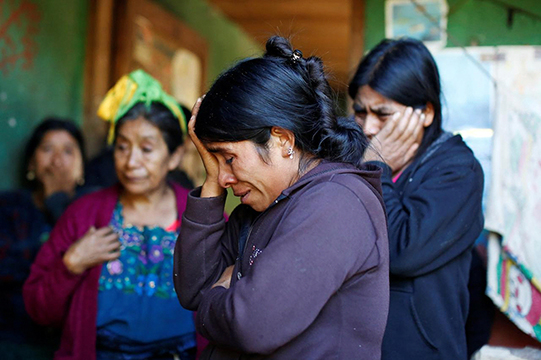YALAMBOJOCH, Guatemala, (Reuters) – Between heavy sobs, Catarina Alonzo explained that when her husband left Guatemala to try to reach the United States, they hoped taking their 8-year-old son would make it easier for the pair to get in. Instead, the boy fell ill and died.
Detained on the U.S. border, Felipe Gomez Alonzo died late on Christmas Eve in a New Mexico hospital a few weeks after setting off with his father, becoming the second Guatemalan child to die this month while in U.S. custody.
The two deaths have led to increased criticism of the Trump administration’s hardline stance on illegal immigration, as well as fresh scrutiny of why some migrants from Central America travel with children on the long, dangerous road north.
Speaking at her home in a mountainous region of western Guatemala, Catarina Alonzo said neighbors had told the family that taking a child would provide her husband with a way in. “Lots of them have gone with children and managed to cross, even if they’re held for a month or two. But they always manage to get across easily,” she told Reuters in an interview.U.S. Customs and Border Protection (CBP) has yet to give an official cause of death for the boy, prompting Democratic lawmakers to intensify calls for an investigation.
The Department of Homeland Security, which says that Felipe Gomez Alonzo and 7-year-old Jakelin Caal, who died on Dec. 8, were the first children to die in CBP custody in a decade, this week said it would step up medical checks of migrant children to try to prevent any more deaths.
Alonzo, an indigenous Maya and native speaker of Chuj, has little Spanish and communicated through a translator. Wearing a sweatshirt and a purple dress, she spoke outside her hut in Yalambojoch, a village of about 1,000 people near the Mexican border.
She related how her son and his father, Agustin, an agricultural worker, had left in early December to find work in the United States to pay off debts. The two also hoped the boy would get a better education in the United States, she said.
Still, Alonzo said her husband had doubts and at one point decided he did not want to take the boy. But that upset the boy, so they resolved he should go.
Alonzo’s sobs could be heard for minutes outside the house before she came out to be interviewed. Afterwards she went back inside to a tiny altar she had adorned with three photos of the boy that a local school teacher had printed out for her.
The altar stood to one side of a room with cement walls that serves as a bedroom and living area for Alonzo and her three surviving children. Adjoining it was a kitchen with a dirt floor and wooden walls.
Her husband remains in U.S. custody.
Marta Larra, a spokeswoman for Guatemala’s Foreign Ministry, said smugglers known as “coyotes” often encourage migrants to take children as a form of “visa.” Many coyotes, she noted, are trusted by migrant families, so their word carries weight.
But Lucas Perez, the mayor of Yalambojoch, said some coyotes are only interested in ripping off people. Still, for many migrants trying to cross the U.S. border, taking a child along was the “only option,” he told Reuters.
Describing migration from the area as “constant,” Perez estimated about 200 people from the tiny village live in the United States.
Agustin Gomez, the boy’s father, has two brothers in the United States he hoped to meet, his wife said.
Next to her hut, laborers worked on a two-story concrete house with a twin-gabled, tiled roof – evidence of the money coming back from the United States, the mayor said.
Under U.S. law, families from countries that do not border the United States cannot be immediately deported, and because of a longstanding legal settlement, there are restrictions on how long U.S. authorities can detain migrant children.
As a result, families with children are often released to await an immigration court hearing, which can be scheduled well into the future due to ballooning backlogs.
U.S. President Donald Trump has tried to reverse the policy, which he calls “catch and release,” but has been blocked by lawsuits in federal court.
His Democratic opponents have seized on the deaths of the two Guatemalan children to attack his policies. On Thursday, Senator Dianne Feinstein urged the Senate to hold a hearing in the new year on how children are treated in U.S. custody.
In the meantime, Trump’s insistence on building a southern border wall has given coyotes a fresh argument to promote migration, Larra said.
“According to interviews (with migrants), the coyotes are saying ‘it’s now or never’ because the wall is going to be built, and it won’t be possible to cross,” she said.

